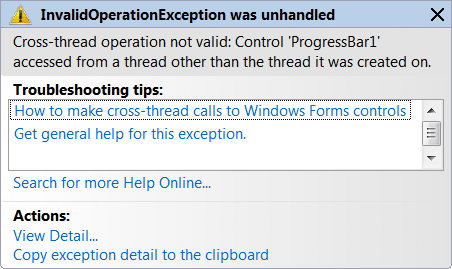Normally, when you are using .NET built-in progress bar in a multi-threaded application without Callback tricks, you are likely to get an exception on value assign, similar to the following:

I recently wrote a fairly simple wrapper class, which solves the problem. See code below:
1
2
3
4
5
6
7
8
9
10
11
12
13
14
15
16
17
18
19
20
21
22
23
24
25
| Public Class MyProgressBar : Inherits ProgressBar
Public Delegate Sub SetRefreshCallback()
Public Delegate Sub SetValueCallback(ByVal v As Integer)
Public Shadows Text As String = String.Empty
Public Overloads Property Value() As Integer
Get
Return MyBase.Value
End Get
Set(ByVal value As Integer)
If Me.InvokeRequired Then
Me.Invoke(New SetValueCallback(AddressOf SetValue), New Object() {value})
Else
MyBase.Value = value
End If
End Set
End Property
Private Sub SetValue(ByVal v As Integer)
MyBase.Value = v
End Sub
End Class
|
Usage is simple: just assign the value like you normally do, in a thread worker sub. The difference of MyProgressBar is that you will not get a cross-thread exception.
Here’s a test project to play with. I put the original call there on purpose, to let you see the error.
